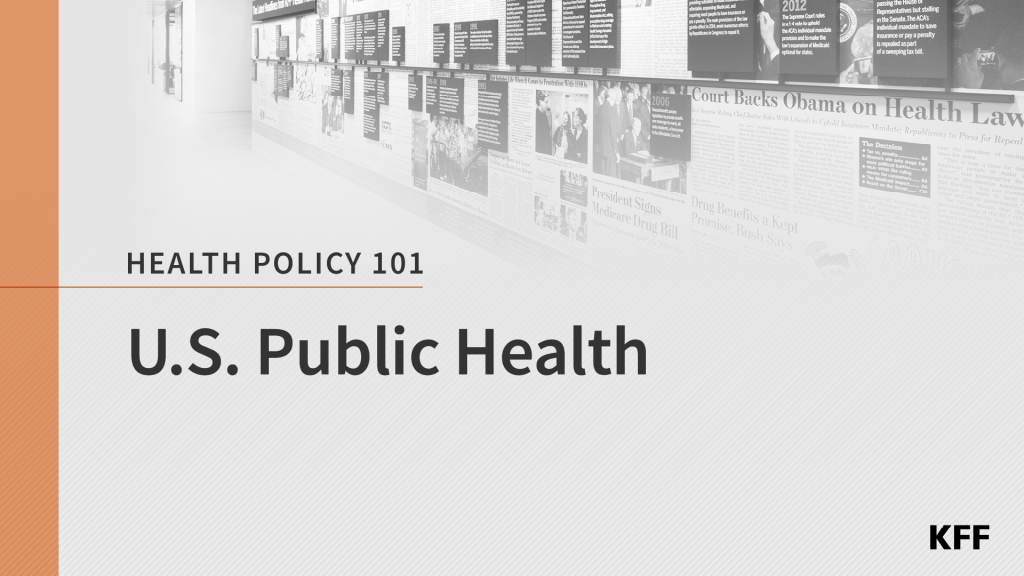What’s in the American Rescue Plan for COVID-19 Vaccine and Other Public Health Efforts?
This post provides summary of funding for COVID-19 vaccines and other public health efforts in the American Rescue Plan Act of 2021.
The independent source for health policy research, polling, and news.
KFF’s policy research provides facts and analysis on a wide range of policy issues and public programs.
KFF designs, conducts and analyzes original public opinion and survey research on Americans’ attitudes, knowledge, and experiences with the health care system to help amplify the public’s voice in major national debates.
KFF Health News is a national newsroom that produces in-depth journalism about health issues and is one of the organization’s core operating programs.
Health Policy 101 is a comprehensive guide covering fundamental aspects of U.S. health policy and programs, including Medicare, Medicaid, the Affordable Care Act, employer-sponsored insurance, the uninsured population, health care costs and affordability, women's health issues, and health care politics. The Public Health chapter examines how public health is governed and delivered in the United States. It includes explanations of key public health frameworks, services, capabilities and characteristics, how the public health system works in state, local and territorial governments, and public health funding, workforce, and communication challenges in an era of declining trust.
This post provides summary of funding for COVID-19 vaccines and other public health efforts in the American Rescue Plan Act of 2021.
The latest report from the KFF COVID-19 Vaccine Monitor examines how the COVID-19 pandemic has impacted the lives of lesbian, gay, bisexual and transgender (LGBT) people and finds that larger shares of LGBT adults report economic losses and mental health struggles than their non-LGBT counterparts.
This analysis examines the reported experiences among self-identified LGBT individuals based two months of KFF COVID-19 Vaccine Monitor reports and finds that LGBT people have experienced the COVID-19 pandemic differently than non-LGBT people, including being harder hit in some areas.
This report shows about half over the age of 65 say they have already received at least one dose of the vaccine or have scheduled an appointment to do so. It also examines how easy or difficult it has been for people to get an appointment and information about the vaccine, and where the public would most like to receive it.
March 4, 2021 – THE CONVERSATION: Between Us, About Us. is a new campaign to provide Black communities with credible information about the COVID-19 vaccines co-developed by KFF (Kaiser Family Foundation) and the Black Coalition Against COVID.
While Enthusiasm Rises, a Persistent Minority Say They Definitely Will Not Get Vaccinated; Republicans, Rural Residents, and Essential Workers Outside Health Care Are Most Reluctant Groups More than half of Americans (55%) now say they want to get vaccinated as soon as possible (37%) or have already received at least one dose (18%), up 8…
The Latest KFF COVID-19 Vaccine Monitor finds a growing share of U.S. adults say they have already gotten at least one dose of the vaccine or want to get vaccinated as soon as possible. Black and Hispanic adults remain more likely to want to wait and see how the vaccine is working for others before getting it themselves.
This policy watch piece highlights the potential challenges surrounding COVID-19 vaccinations among Hispanic people, whose health and finances have been extremely hard hit by the pandemic. Low rates of vaccination among Hispanic people would leave them at increased risk for the virus, could further widen existing health disparities, and would leave gaps that hinder our ability to achieve overall population immunity.
The latest from the KFF COVID-19 Vaccine Monitor finds that Black men (45%) and women (41%) are more likely than other groups to want to “wait and see” how the COVID-19 vaccine works for others before getting it themselves, making them a key target for public health officials seeking to boost vaccination rates equitably.
People with medical conditions that put them at higher risk of developing serious COVID-19 illness are next in line to get vaccinated in many states, though states are making very different choices about how to prioritize those within this large group, finds a KFF analysis of state policies.
© 2026 KFF
